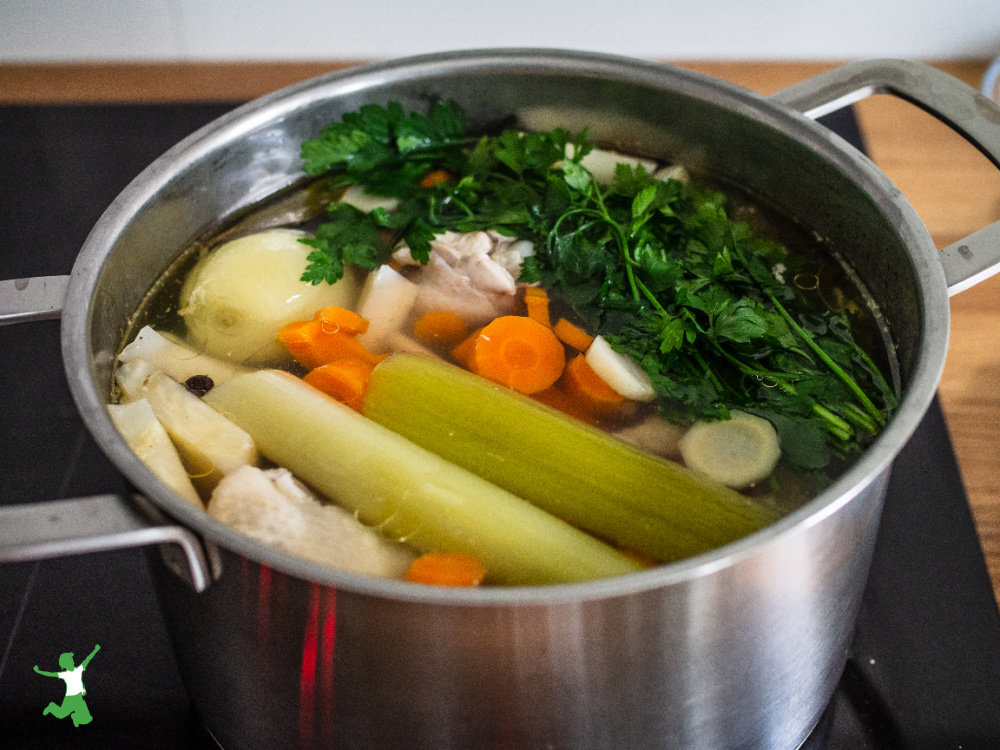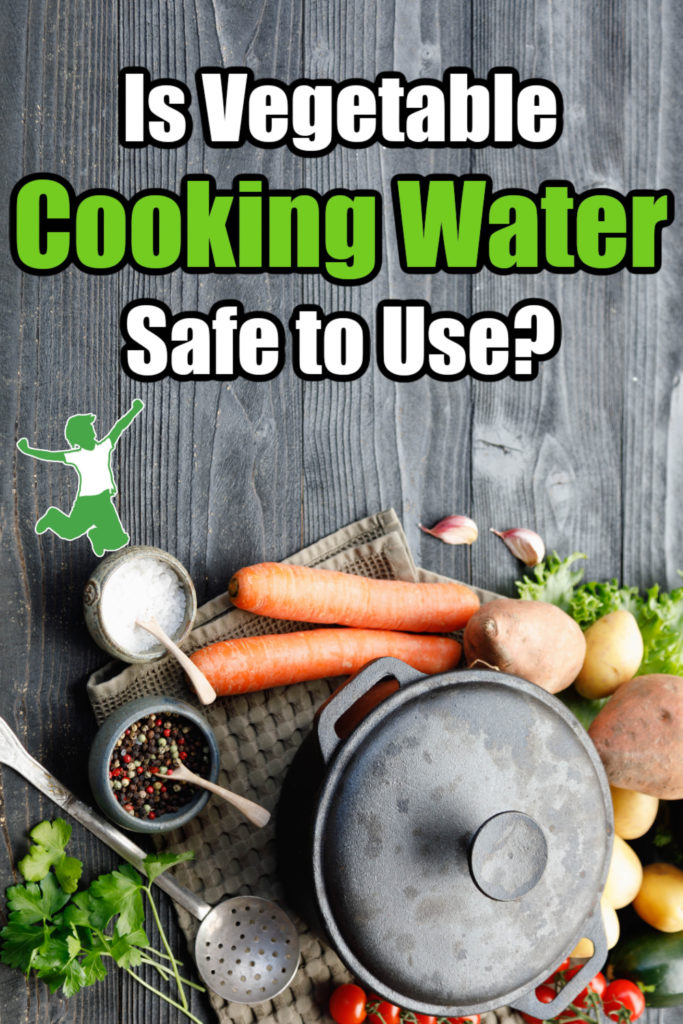Guidelines for when vegetable cooking water is safe to use and when it is best to toss due to nitrites, residues or anti-nutrients that can do more harm than good.

Adelle Davis popularized the practice of saving vegetable cooking water during the Leave it To Beaver era of the American 1950s.
She reasoned that any vitamins and minerals lost from cooking the vegetables would end up in the water.
This supposedly nutrient-rich cooking water could then be added to homemade soups or sauces with the nutrition benefiting those that consumed them.
This notion took hold and has not let go to this day.
Unfortunately, reserving vegetable cooking water can do more harm than good.
Consider the reasons below before you use it in your dishes. How to know your veggie cooking water is safe is discussed as well.
Chemical Residues
If the vegetables that are cooked are not organic, pesticides and nitrites from commercially produced fertilizers can end up in the cooking water.
Even low to no spray veggies such as asparagus would not be safe.
These crops are still typically fertilized with commercial preparations that are high in nitrites.
Anti-Nutrients
Cooking cruciferous vegetables such as broccoli, cauliflower, cabbage, Brussels sprouts, and kale would add goitrogenic (thyroid blocking) substances to the cooking water which should be discarded.
Water used to boil potatoes would contain chemicals called hemagglutinins that disrupt red blood cell formation.
Dark green, leafy vegetables such as beet greens, raw spinach, and chard contain oxalic acid that blocks calcium and iron absorption.
This irritating substance also can cause distress to the sensitive mucous membranes in the mouth and intestinal tract and contributes to the formation of kidney stones.
Consuming raw crucifers or dark, leafy greens is not an alternative either as the substances that cause problems when in the cooking water also cause problems if consumed directly with the vegetable in an uncooked state such as a raw green smoothie.
Legumes & Beans
For the last few years, the vegan community has popularized the trend of reusing legume cooking water, particularly from chickpeas.
This isn’t a safe practice even if the legumes or beans are soaked before cooking.
This soapy, slimy water is called aquafaba and is used as an egg replacement, particularly in dessert recipes. It whips up foamy just like egg whites.
Published research reveals that chickpea cooking water contains saponins, a potent anti-nutrient that contributes to leaky gut, which is at epidemic levels today.
It is also not advisable for pregnant women to consume this substance as it is a miscarriage risk.
Safe Vegetable Cooking Water
Do you really want to use vegetable cooking water as a frugal tool in your kitchen routine?
Consider this list of some of the most popular vegetables below. They are safe to use for that purpose.
- carrots
- turnips
- potatoes (peelings)
- parsnips
- beets
- celery
- organic pumpkins and squash (including zucchini)
- organic onions, leeks, and garlic
- nightshades (tomatoes, eggplant, and peppers among a few others)
For example, this potassium broth recipe uses vegetables simmered in water from the list above.
Simple Guidelines To Follow
Do you find it confusing to remember the distinctions between which organic veggies are safe to use and which are not?
Or, do you buy some veggies organic and others conventional?
If so, it is best to just adopt the practice of not using the cooking water at all.
This is particularly true if you tend to mix veggies together when cooking them.
Never Use Veggie Water for Baby Food
It is of particular importance NOT to use vegetable cooking water for use in pureeing homemade baby food.
Use pure filtered water instead, or if baby is old enough, some homemade bone broth or meat stock.
Final Caution to Consider
One final word of caution.
All vegetables tend to form nitrates after cooking and during storage. These nitrates can transform into strong carcinogens in the intestines.
Hence, it is best to avoid refrigerating and reheating vegetables, particularly leafy, green vegetables which concentrate nitrates when grown commercially.
References
Nourishing Traditions Cookbook









looks like the only way to eat safe is to grow your own vegetables…
So, like does that mean no more soup????? Soup requires boiling vegetables in that very same water you’re going to eat.
I am confused also when read this information and look at my family health. My parents both 91 years old, my father’s brothers 94 and 96 (the uncle 96 passed away 2 years ago). They are poor and eat mostly vegetables (boil, soup and stir fry) with rice. I am 65 and do the same eating habit as my parents. I have not go to hospital and only see doctor for general check up a few times. Which way should I go? Quit boiling vegetable? quit drinking cooked water from vegetables?
I think I will copy my parents habit for the hack off my health.
I cannot understand how any water-soluble compound would not be removed when washing the vegetables. If these bad materials remained, then they would stay with the vegetable when consumed. Either it is contaminated, or it is not. The idea that the water is contaminated but the vegetable is not does not make any sense to me. Granted, my chemistry studies were limited to classes I took at Cornell University (perhaps they lack the sophistication the scions of wealthy families who organically farm in the Northeast). What am I missing?
Furthermore, how can pesticides be sufficiently cleaned off of carrots, but not be cleaned off of turnip greens (both personal favorites)? My misunderstanding lies with the compounds that are on the vegetable in question. If these cannot be washed off, then how is it safe to eat them, but not the water in which they were cooked? If it is a bacterial issue, then both the veggies & the water are purified through heat. Otherwise, any other compound would contaminate both water and the vegetables themselves. Either I am missing a key logical transition, or this article is incorrect.
The pesticides don’t just sit on the outside of the vegetables, they’re absorbed into them. Common sense man…
Her book, Let’s Have Healthy Children is a good read supports the WAPF prinicples on raw milk formula, etc.
I would be concerned about the sprays, etc. transferring into the water.
interesting
So… hundreds of years of traditional food prep is out the door? Because for centuries people of many cultures made soups and stews out of mostly vegetables and leafy greens while adding whatever meat they could scrounge up. Are you saying that for hundreds of years we have been poisoning ourselves, and that just now we are somehow smart enough to stay away from these? That seems completely opposite to your usual philosophy.
I don’t have a problem with how it was written. If you don’t understand, look further into it. Google it. Personally, I think it is good information, but as with everything, you can take it too far and worry about it, or go on living the best you can.
Wait. Whaaaaa? I’m with Karen. No cruciferous or dark greens at all? Even organic? I’m so confused by this article.
People who are criticizing this article are simply being intellectually-dishonest. What the author is saying is ABSOLUTELY CORRECT regarding oxalate, and if you “experts” who are condemning the author for attempting to educate people like ourselves who are health-conscious are not able to admit that coniferous-vegetables are often-times dangerously high in oxalate and there is a BETTER way to prepare them to limit this POISON, then you are doing yourselves and those who listen to you a major dis-service.
THANK YOU for writing this very informative article, and know that it is sincerely appreciated by those who are able to fully understand your point, and the information provided.
Lindsey
this is just fear-mongering. Oxalic acid is an anti-nutrient. In concentrations found in whole foods, it only inhibits the absorption of calcium from that food. So if I roast some beets and eat them with some sauteed kale, it only inhibits us from apsorbing a part of their calcium. this is part of what we call “bioavailability.” to call something “dangerous” is just spreading fear, uncertainty and doubt without talking about the nuances, much of which is really nothing to worry about.
the original author’s claim that “saving the cooking water can do more harm than good” is a truistic statement. anything is possible. so is the opposite: it can do more good than harm. more productive to talk about the circumstances under which each statement is true rather than make baseless blanket statements.
veggies contain several times the amount of nitrates than cured meats, and form the major source of nitrates in our diet. they also contain many different micronutrients that protect us from nitrosamine formation and its harmful effects. eat veggies for fiber and micro-nutrients, and meat for fat and protein. don’t worry much about the bacon if you are eating a balanced diet: marksdailyapple.com/a-quick-guide-to-bacon/